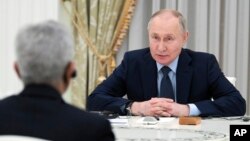India and Russia Wednesday reaffirmed their strong friendship and discussed deepening trade and strategic ties during a visit to Moscow by Indian External Affairs Minister Subrahmanyam Jaishankar.
Jaishankar said at a meeting with Russian President Vladimir Putin on Wednesday that the two countries have “made progress” in trade, which now exceeds $50 billion.
“We believe that this is something whose potential is now only beginning to be visible,” he said.
India has emerged as one of Russia’s major economic partners as it has exponentially increased its imports of Russian crude oil, ignoring Western sanctions that were imposed in 2022 over the war in Ukraine.
New Delhi, which has taken a neutral stance on the Ukraine conflict, has maintained its ties with Moscow citing its decades-old friendship with its old ally.
Putin was quoted by Tass as saying at the meeting with Jaishankar that the trade between Russia and India is growing for the second year in a row, particularly due to crude oil and high technology areas.
Putin also invited Indian Prime Minister Narendra Modi to visit Moscow.
“We will be able to discuss all current issues, talk about the outlook for the development of Russian-Indian relations,” according to Tass.
India and Russia have held annual summits for over two decades but have not held one since the war in Ukraine erupted last year.
New Delhi has not given any official reason for not holding the meetings, but analysts see it as part of India’s attempt to walk a fine line as its ties grow with Western countries. Modi visited Washington in June for a meeting with U.S. President Joe Biden that was seen as giving new momentum to their partnership.
“India has avoided a summit meeting with Putin because it does not want to be seen as too close to Russia. At the same time it is important to show to Russia and the world that we have not abandoned them in any way,” according to Manoj Joshi, distinguished fellow at the Observer Research Foundation in New Delhi. “The foreign minister’s visit to Moscow emphasizes that we still have close ties but at the same time it avoids all the attention that a high-profile summit gets.”
Putin’s meeting with Jaishankar is considered significant because he usually does not meet visiting foreign ministers. Analysts see it as an effort to underline that Russia is not isolated.
“It is a statement on India’s relative importance to Russia. India is a large country and is doing well economically. To show that you have good ties with New Delhi is important for Russia at this stage when they have their back to the wall,” Joshi said.
Jaishankar, who is on a five-day visit to Moscow, also met with Russian Foreign Affairs Minister Sergey Lavrov on Wednesday.
At a joint news conference, Lavrov said they discussed “the prospects for military-technical cooperation, including the joint production of modern types of weapons.”
Russia was India’s major arms supplier for decades, and New Delhi still imports about two-thirds of its military equipment from Moscow, although it has tried to diversify its purchases in recent years.
Analysts point out that India remains reliant on Russia in both the defense and energy sectors.
Calling Russia India’s “valued and time-tested partner,” Jaishankar said ties between the two countries “are based on strategic convergence on geopolitical interests.”
The two countries also signed agreements related to the construction of future power-generating units at the Kudankulam nuclear power plant that is being built in southern India with Russian assistance.
During the visit, Jaishankar called India’s relations with Russia “the only constant in global politics.”
In a meeting with Indians living in Moscow on Tuesday, he said that “typically defense, nuclear and space are collaborations you only do with countries with whom you have a high degree of trust.”

